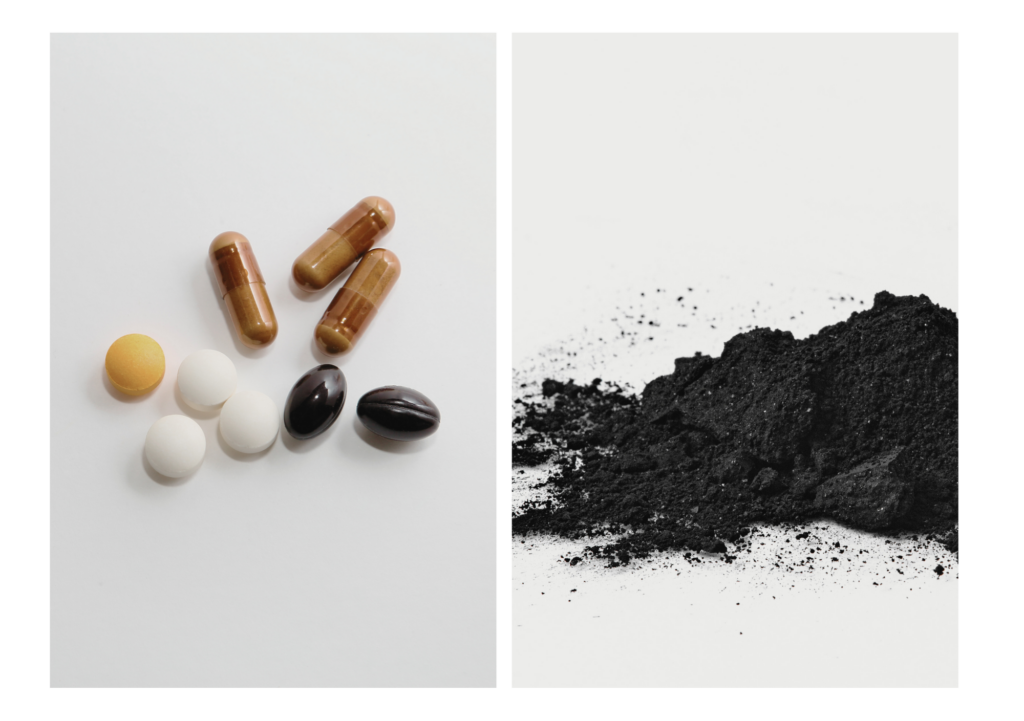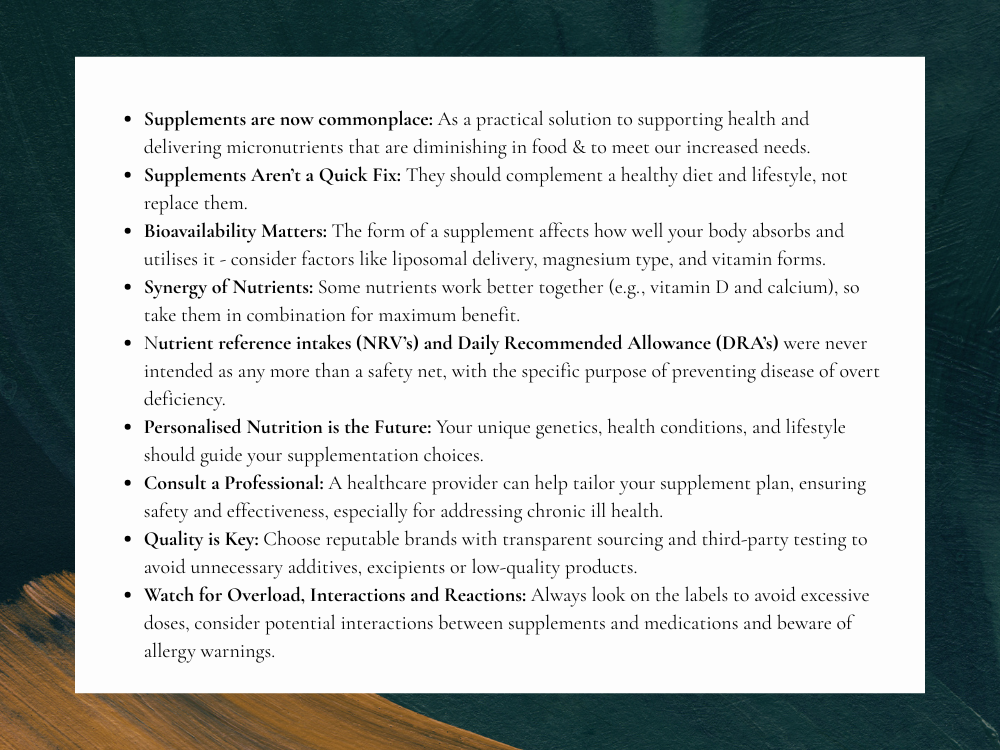BLUE LIGHT CARD DISCOUNTS available across all therapies and packages. Thank you NHS.
Smart Supplementation: Tailoring Nutrients to Your Body’s Needs

In an era where health trends come and go, one thing remains consistent: supplements are here to stay. With an ever-growing industry promising everything from increased energy to better sleep, it’s easy to see why people seek quick fixes, hoping that popping a pill or two will provide an instant resolution. In a world of fast-paced lifestyles and instant gratification, the allure of a simple solution to complex health concerns is tempting. We’re conditioned to believe that a quick supplement can magically restore balance or address chronic issues, without considering the deeper, more intricate factors at play in our bodies and health.
Despite some cynics still claiming supplementation is unnecessary, there is no question they have a valid place in helping people restore, maintain or optimise their health. However, in today’s noisy health landscape, where we’re constantly bombarded with information but often little nuance or clarity, how do we unlock supplements potential without the pitfalls and ensure we understand the science, truly consider the safety and maximise the opportunity they present to meet our individual wants and needs?
To truly utilise the potential supplements hold, we need to go beyond surface-level crazes and evaluate the specific nutrients we need, how they’re absorbed, and whether they align with our individual health goals. By carefully considering factors like our unique chemistry, bioavailability, quality, and the right dosage, we can avoid the common pitfalls and harness the power of supplements to support long-term wellbeing.

Why Do We Need Supplements?
Every reaction, biochemical pathway, and physiological event that takes place in our bodies, requires nutrients at each stage. Intricate, elaborate and perfectly organised sequences of vitamins, minerals, amino acids and fats, allow our bodies to function each minute of every day. In today’s world, the need for supplements has become more pronounced due to a variety of environmental, lifestyle, and medical factors that impact our ability to maintain optimal health through diet alone.
Environmental Factors:
It is a sombre fact that in the current modern world, we cannot 100% rely on the quality and nutrient density of even the best fresh produce. Intensive farming, depleted soils, chemical use, and the effects of polluted water all combine to create suboptimal conditions for growing nutrient-dense food. The widespread use of monocropping, where the same crop is planted year after year, strips the soil of essential minerals, leaving it unable to naturally replenish nutrients. Crops no longer benefit from the natural process of re-mineralisation, where plant and animal waste would traditionally return vital nutrients back to the earth. This leaves the soil poorer in minerals, and as a result, the foods we grow often contain fewer essential vitamins and minerals.
Furthermore, modern farming practices like deep ploughing have disturbed the natural ecosystems that once enriched the soil, including vital organisms like mycorrhiza – a beneficial fungus that helps plants absorb nutrients. The widespread use of pesticides, herbicides, and fungicides, are designed to protect crops but can also interfere with the plants’ ability to absorb essential nutrients from the soil. These chemicals can diminish the nutrient density of our food by inhibiting the uptake of vital minerals like magnesium, zinc, and iron. The depletion of these ecosystems makes it even harder for crops to access the full spectrum of nutrients they need. To make matters worse, the long-distance shipping of produce often leads to further nutrient degradation as fruits and vegetables lose their freshness and nutrient content during transportation. Wax coatings or fumigation, can degrade nutrients like vitamin C, antioxidants, and B vitamins, which are sensitive to light, heat, and air.
All of these factors create an environment where the food we eat, despite our best efforts to choose healthy options, simply isn’t as nutritionally robust as the produce our ancestors enjoyed, making it harder for us to meet our nutritional needs from food alone.
Modern Living
The demands of modern life, coupled with the constant pressures of daily responsibilities, have significantly increased our need for supplemental nutrients. Stress is one of the biggest contributors to nutrient depletion in the body. When we experience high levels of stress, our bodies consume more vital nutrients like magnesium, vitamin C, and B vitamins, which are essential for managing stress and supporting adrenal health. Chronic stress can lead to a depletion of these nutrients, making us more vulnerable to fatigue, anxiety, and weakened immune function. Additionally, the fast-paced nature of modern living often leads to poor lifestyle choices, such as lack of sleep, insufficient exercise, and unhealthy eating and alcohol habits, all of which further strain the body’s nutritional reserves and hinder its ability to recover and thrive.
Moreover, convenience eating has become the norm for many, with busy schedules leaving little time to prepare whole, nutritious meals. Processed foods – often rich in added sugars, unhealthy fats, and artificial additives – have replaced fresh fruits and vegetables in many people’s diets. While these convenience foods may offer quick solutions for busy individuals, they are often devoid of the vitamins, minerals, and fibre essential for optimal health. This creates significant nutritional gaps in our diet, leaving us deficient in key nutrients that are vital. Without a balanced intake of nutrient-dense foods, our bodies may struggle to meet their daily nutritional requirements, making supplementation an important tool to fill those gaps.
On top of the stress, lifestyle choices, and poor nutrition, we are also burdened with an extra toxic load from chemicals that are pervasive throughout our food chain and home products. The pesticides, herbicides, and preservatives used in food production, as well as pollutants in the environment, add an additional strain on the body’s detoxification systems. These toxins can disrupt hormones, impair immune function, and cause inflammation, which can deplete the body’s nutrients more rapidly. As the body works harder to process and eliminate these toxins, it uses up essential nutrients that are crucial for detoxification. This combined toxic burden can make it even more challenging for the body to maintain balance and health, further highlighting the need for supplements to support detoxification, replenish lost nutrients, and ensure the body functions optimally.
Medication Depletion
In the UK, medication use is widespread, with millions relying on prescribed drugs to manage various health conditions. This high prevalence underscores the importance of understanding how these medications can impact our nutritional health.
Many commonly prescribed medications are known to deplete essential nutrients in the body. For example, statins, used to lower cholesterol, can reduce levels of Coenzyme Q10 (CoQ10), a vital antioxidant that supports heart health and energy production. Antacids, often used to treat heartburn and acid reflux, can interfere with the absorption of nutrients like vitamin B12, magnesium, calcium, and iron, potentially leading to deficiencies over time. Antibiotics can disrupt the gut microbiome, leading to decreased absorption of B vitamins, biotin, potassium, and vitamin K. Additionally, diuretics, commonly prescribed for high blood pressure, can lead to the loss of potassium, magnesium, zinc, and folic acid, increasing the risk of deficiencies.
These nutrient depletions can have significant health implications. The body’s increased demand for certain nutrients, combined with impaired absorption, can create a vicious cycle where deficiencies exacerbate health problems, bringing new symptoms and disease.

Understanding the Science Behind Supplements
When it comes to supplements, it’s not just about taking the right nutrients, it’s essential to understand how the body absorbs and utilises them. From the form of the supplement to the way nutrients work together, each factor plays a role in their effectiveness.
Bioavailability: How the Body Absorbs and Utilises Nutrients
Bioavailability refers to the proportion of a nutrient that enters the bloodstream and is available for the body to use. The bioavailability of a supplement can vary greatly depending on its form and how it’s processed. For instance, some nutrients are more easily absorbed when they come from food-based supplements, as they often contain co-factors and enzymes that aid in digestion and absorption. In contrast, synthetic supplements may have lower bioavailability, meaning your body might not absorb as much of the nutrient, even though you’re taking it in a concentrated form.
Synthetic Supplements: A Better Option for Sensitivities and Allergies
While food-based supplements tend to be more easily absorbed, synthetic supplements have their advantages, especially for individuals with sensitivities or allergies. Food-based supplements may contain additional compounds or fillers derived from common allergens like dairy, soy, gluten, or yeast. Or contain other foods that, whilst uncommon, still illicit an immune response and trigger reactions in sensitive individuals. Synthetic supplements, on the other hand, are often made in a controlled environment, allowing for purer formulations that are free from these allergens, making them a safer option for those with specific dietary restrictions.

Scientific Modes of Delivery for Supplements
Supplement Forms: Finding the right fit
Supplements come in various forms, including pills, liquids, and powders, each offering unique benefits. Pills and capsules are convenient and easy to take, providing a precise dosage and being portable for on-the-go use. Liquid supplements are absorbed more quickly by the body, making them a great option for those who may have difficulty swallowing pills or need fast absorption. Powders, often mixed with water or smoothies, can be easily customised to higher doses and are ideal for those who prefer a larger intake or need supplements like protein. Each form has its advantages depending on personal preferences, absorption speed, and ease of use.
Liposomal Delivery: Enhanced Absorption
Liposomal supplements use a fat-based delivery system that encapsulates nutrients in a lipid layer, which protects them from stomach acids and enhances their absorption in the intestines. This delivery system is especially useful for nutrients that are poorly absorbed or sensitive to digestive enzymes, such as vitamin C, curcumin (from turmeric), or glutathione. The liposomal encapsulation allows these nutrients to be transported directly into the bloodstream more effectively, leading to higher bioavailability and better therapeutic outcomes.
Micronized and Nanoparticle Delivery: Ultra-Fine Nutrient Particles
Micronized or nanoparticle delivery systems involve breaking down nutrients into extremely fine particles to increase their surface area. This increases the nutrient’s absorption rate by making it easier for the body to absorb it through the intestinal wall.
Preformed vs. Provitamin Forms: How Different Vitamins and Minerals Work
Understanding the difference between preformed and provitamin forms is important for selecting the right type of supplement. Preformed vitamins are in their active form, meaning the body can use them immediately. For instance, preformed vitamin A, found in animal products, doesn’t need to be converted and is ready to be absorbed. In contrast, provitamins like beta-carotene (found in plants) must first be converted into their active form before the body can use them. While the body can typically handle this conversion, some individuals – due to age, genetics, or health conditions – may find it difficult, making preformed versions more effective in those cases.
Enteric-Coated Supplements: Targeted Release
Enteric-coated supplements are designed to pass through the stomach without being broken down. These coatings prevent the supplement from being digested in the stomach, allowing it to reach the small intestine where it can be absorbed. This mode of delivery is particularly useful for nutrients or herbs that might irritate the stomach lining. The enteric coating ensures that the nutrient is delivered directly to the part of the digestive system where it is needed most, enhancing its efficacy and reducing the risk of gastrointestinal discomfort.
Slow-Release or Extended-Release Supplements: Sustained Nutrient Delivery
Slow-release or extended-release supplements are designed to release their active ingredients gradually over time, providing a sustained effect. This method is beneficial for nutrients that are required continuously throughout the day, such as magnesium, which supports muscle relaxation and sleep, or vitamin B12, which aids energy production. By releasing the nutrient slowly, these supplements help maintain stable levels in the body, preventing the peaks and troughs that can occur with fast-digesting supplements.
Sublingual and Buccal Delivery: Direct Absorption Through the Mucous Membranes
Sublingual (under the tongue) and buccal (between the cheek and gums) delivery methods are designed to allow nutrients to be absorbed directly through the mucous membranes in the mouth. This bypasses the digestive system entirely, allowing for faster and more direct absorption into the bloodstream. This method is particularly useful for nutrients that are poorly absorbed through the stomach or intestines, such as vitamin B12, melatonin, orcertain minerals. It provides a rapid, efficient way to get nutrients into the body, particularly when quick action is needed or digestion is impaired.
Synergy of Nutrients: Maximising Effectiveness
Certain nutrients are more effective when taken together- this is known as nutrient synergy. For example, vitamin D helps the body absorb calcium, making the two vital for maintaining bone health. Likewise, magnesium can improve the effectiveness of vitamin B6, which helps regulate mood and support nervous system health. By taking nutrients that work synergistically, you can increase the potency of each supplement, ensuring your body gets the full benefits of each nutrient. Another key example is the combination of vitamin C and iron. Vitamin C significantly boosts the absorption of non-heme iron (the type of iron found in plant-based foods), making it particularly valuable for individuals following a vegetarian or vegan diet.
By taking synergistic nutrients together, you can increase the potency of each supplement, ensuring that your body gets the full benefits of the nutrients you’re consuming. Whilst this can be crucial for maximising the effectiveness of supplements, it is also equally important when it comes to the potential to overdose or cause imbalances through excessive intake.

Types of Nutrients and Their Impact on Absorption
The form in which nutrients are consumed significantly impacts how well they are absorbed and utilised by the body. Various factors, including age, gut health, and genetics, can affect nutrient absorption, making it important to choose the right form of supplement based on individual needs. Here’s a brief look at how some different forms of common nutrients impact their absorption and effectiveness.
Magnesium: Different Forms for Different Needs
Citrate is well-absorbed and often used for muscle relaxation and constipation relief. Glycinate, known for its high bioavailability, is gentle on the stomach and ideal for cognitive function and sleep support. Malate is helpful for fatigue and muscle pain, though it may be less absorbed in individuals with digestive issues or older adults.
Vitamin D: Activated vs. Inactive Forms
Methylcobalamin is the active form of vitamin B12, with higher bioavailability, making it ideal for individuals with digestive problems or age-related absorption issues. Cyanocobalamin, a synthetic form, must be converted by the body and may be less effective, especially in those with low intrinsic factor or gut health issues.
Iron: Heme vs. Non-Heme Iron
Heme iron, found in animal products, is more easily absorbed than non-heme iron, which comes from plant-based sources. Vitamin C can enhance the absorption of non-heme iron, making it a useful addition for those following plant-based diets. Digestive conditions or genetic variations can also influence iron absorption and should be considered when selecting iron supplements.
Omega-3 Fatty Acids: EPA vs. DHA
Both EPA and DHA are highly bioavailable omega-3 fatty acids. EPA is beneficial for heart health and reducing inflammation, while DHA supports cognitive function and vision. Absorption can be affected by gut health and genetics, with individuals facing digestive issues potentially benefiting from higher doses or plant-based omega-3 sources.
Vitamin K: K1 vs. K2
Vitamin K2 is more bioavailable than K1 and plays a critical role in bone health and cardiovascular health, helping regulate calcium. K2 is also produced by beneficial gut bacteria highlighting the importance of a healthy microbiome for its absorption.

Personalised Nutrition: The Future of Supplementation
As we move towards a more individualised approach to health, personalised nutrition is emerging as a key area of focus in supplementation. Rather than relying on generalised recommendations, we now have the opportunity to consider how our unique genetics, lifestyle, and health conditions affect our nutritional needs.
RDA’s (Recommended Daily Allowance) and NRV’s (Nutrient Reference Value)
The Recommended Daily Allowance (RDA), first coined in the 1940’s in the U.S and later adopted by the World Health Organisation, provides guidelines based on average nutrient requirements for the general population. Almost identical is the Nutrient Reference Value (NRV) that was first proposed in the1980’s and finally approved in 2014, when the EU wanted a standard way to label foods with nutritional content. While helpful, and specific to gender and age, these values don’t consider individual differences such as health status, genetics, geography or lifestyle. This means that the RDAs, which supplement manufacturers often use as a guide for their formulations, might not meet the needs of everyone – especially those with specific health conditions or unique genetic makeup. The gap between the ideal nutritional needs of an individual and the general recommendations can be significant.
Nutrigenomics: How Your Genes Affect Nutrient Needs
Nutrigenomics is the study of how our genes influence how we absorb, metabolise, and process nutrients. Certain genetic variations, known as single nucleotide polymorphisms (SNPs), can impact how efficiently we metabolise or detoxify specific nutrients, which has far-reaching effects on overall health.
For instance, variations in cytochrome P450 genes can influence how effectively we break down and eliminate toxins from the body, affecting everything from immune function to hormonal balance. This can make some individuals more susceptible to toxic build up and deficiencies if their detoxification systems aren’t operating at full capacity. Similarly, SNPs in genes responsible for stress response – like those that regulate cortisol production – can impact how we handle stress, which in turn affects nutrient needs. For example, people with genetic variations in cortisol regulation may require more magnesium or B vitamins to manage the increased demand on their bodies. Genetic variations, like those in the MTHFR gene, can also affect your ability to convert B vitamins into their active forms. People with these variations may benefit more from methylated B vitamins (like methylfolate), as these are already in their active, usable forms.
Personalised Nutrition
With these advancements in testing and growing science, approaches can move beyond generalisations towards highly personalised nutrition recommendations that enable supplements to be tailored not just to address health needs based on population averages or specific conditions, but to align with each individual’s genetic makeup. Allowing for holistic bespoke plans that encompass our uniqueness, the broad root causes of health conditions, and lifestyle factors, ensuring that nutrients are dosed, absorbed, and utilised effectively. This approach not only addresses individual deficiencies but also supports more effective management of long-term health goals.

The Safety of Supplements: Understanding the Risks & Maximising the Benefits
While supplements can offer great health benefits, it’s essential to approach them with caution to avoid potential risks. By being aware of potential risks, choosing high-quality brands, and understanding label information, you can use supplements safely and effectively to support your health.
Cautions: Potential for Toxicity, Interactions and Reactions
One of the main risks with supplements is the potential for toxicity. Too much of a single nutrient can cause problems in the same way that being deficient in a nutrient can. Taking excessive doses of certain nutrients, like vitamin A, iron, or vitamin D, can lead to harmful side effects. It’s also important to be mindful of interactions between supplements and medications. For example, vitamin K can interfere with blood thinners, while magnesium can affect certain antibiotics.
Many supplements contain hidden allergens or unnecessary additives, such as artificial colours, binders, or fillers, which can trigger sensitivities or allergic reactions. Common allergens like gluten, dairy, soy, or shellfish may also be present. It’s also important to note that ascorbic acid (vitamin C) is often derived from corn, and probiotics may be cultured using yeast, which can be problematic for those with allergies to those. Additionally, gelatine in soft gels may not be suitable for vegetarians or those with sensitivities to animal products. Always read labels carefully and opt for hypoallergenic or allergen-free options when needed. And keep supplements that you take on a daily basis part of any diary investigations if you’re trying to get to the bottom of troublesome symptoms.
Regulation and Transparency: Understanding Label Information & Finding Reputable Brands
Unlike pharmaceuticals, the supplement industry is not as tightly regulated. While some oversight exists, it’s important to understand both their strength and limitations. As the consumers, always do your research, or seek the help of a qualified practitioner. Always review the label information carefully to check for instructions, active ingredients, and potential allergens.
Not all supplements are created equal, and the quality can vary widely between brands. When choosing a supplement, look for reputable brands with nutritional therapists and medical doctors on the team as guidance for formulations, as well as brands that are transparent on ingredient sourcing, third-party testing, and positive customer reviews. Good manufacturing practices (GMP) certification is another key indicator that a supplement meets safety and quality standards. Always check the ingredient list for purity and avoid products with excessive additives or fillers that don’t add value to the supplement’s intended purpose.

Common Pitfalls to Avoid
Fashionable Fixes
It’s easy to get caught up in the hype of trendy supplements, presented in beautiful boxes with sexy branding and/or bold claims but it’s important to approach them with a discerning eye. There’s an awful lot of enthusiastic marketing without much clear communication about who they may help, and crucially, who they may not.
Watch out for celebrity endorsements and podcast promotions. Just because someone famous swears by a product doesn’t necessarily mean it’s right for you or that they’ve partnered with a place engaging in ethical practices or with scientific backing. Many accounts cherry pick health claims and just because a product is heavily marketed doesn’t mean it’s OK.
Be sure to choose supplements based on evidence, not flashy promises. Stick to reputable brands, consult with professionals, and be mindful of the pill-popping mentality – thinking that taking a supplement alone can solve all health issues can be misleading. Supplements should support a healthy lifestyle, not replace it.
Dr Google
While it’s tempting to turn to the internet for answers, self-diagnosing using Dr. Google can be risky. Many people search for information about their symptoms – such as fatigue, eczema or a slow metabolism – and then choose a supplement based solely on what they find. While online resources can be helpful, they often lack the nuance and expertise needed to make informed decisions about your health. Just because a supplement or nutrient is labelled as “natural” doesn’t automatically mean it’s safe or appropriate for everyone. In fact, certain natural remedies can interact with medications or exacerbate underlying health conditions. Without professional guidance, you might be addressing the wrong issue or causing more harm than good.
Don’t Overdo It: More Is Not Always Better
It’s easy to think that if a little is good, then more must be better – especially when it comes to supplements. Seeing large numbers, like 1,000,000 micrograms of a vitamin, can tempt you to think it’s the key to faster or better results. But this is absolutely not the case. In fact, taking excessive amounts of certain nutrients can lead to toxicity and other health issues. When trying a new supplement – especially if you’re sensitive or reactive – always start with a low dosage and gradually increase it, monitoring how your body responds. It’s also crucial to add one new supplement at a time so you can better assess its effects and avoid overwhelming your system. Moderation and mindfulness are key to ensuring your supplements work safely and effectively.
The Importance of Professional Guidance
When it comes to supplementation – especially for addressing ill health or specific concerns – consulting with a healthcare provider is essential. While supplements can offer significant benefits, they’re not a universal solution, and what works for one person may not be right for another. A healthcare provider can help tailor your supplementation plan to your individual needs, taking into account your health history, current medications, and lifestyle. They can recommend the right supplements, at the correct dosages, and ensure they work safely with your existing treatments. This is especially important when dealing with chronic conditions, as certain nutrients may interact with medications or exacerbate underlying issues.
Additionally, a healthcare professional can help you create a holistic health plan that goes beyond just supplements. They’ll work with you to integrate diet and lifestyle changes that support your overall wellbeing, giving you a more balanced and sustainable approach to health. Supplements are just one piece of the puzzle, and whilst beneficial, without considering factors like nutrition, exercise, sleep, and stress management, you may not achieve the best results nor heal from so many chronic conditions.
Key Takeaways:

In Summary: The Balanced Approach to Supplements
In the debate over supplements, it’s clear that they can be a valuable tool when used correctly and targeted to your individual needs. However, it’s essential to remember that supplementing your health should always be part of a balanced approach – one that includes a healthy diet, proper lifestyle choices, and, importantly, professional guidance. Supplements are not a cure-all, and the solution to your health goes beyond just taking a pill. You also do not need to be taking every single one out there to meet your goals. Consulting with a healthcare provider ensures you’re using supplements safely and effectively, with personalised, evidence-based advice tailored to your unique health profile. With the right approach, supplements can support your overall well-being without replacing the foundations of a healthy life.
Find this blog post in downloadable form as a guide to keep in the resources section.
A fan of people, plants, leisurely feasts and a good brew, she runs clinics, workshops, women’s circles and wellbeing retreats alongside developing bespoke lifestyle plans for people with complex allergy needs.
Sophie is a certified and registered multi-disciplinary practitioner specialising in the field of immune health and allergy.
© 2021- A Modern Topic
Come connect, share, and learn gently.
For curious minds and open perspectives.
@amoderntopic
Site credit